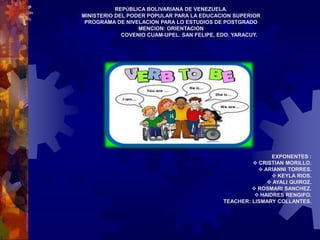To be
- 1. REP├ÜBLICA BOLIVARIANA DE VENEZUELA. MINISTERIO DEL PODER POPULAR PARA LA EDUCACION SUPERIOR PROGRAMA DE NIVELACION PARA LO ESTUDIOS DE POSTGRADO MENCION: ORIENTACION COVENIO CUAM-UPEL. SAN FELIPE, EDO. YARACUY. EXPONENTES : ’üČ CRISTIAN MORILLO. ’üČ ARIANNI TORRES. ’üČ KEYLA RIOS. ’üČ AYALI QUIROZ. ’üČ ROSMARI SANCHEZ. ’üČ HAIDRES RENGIFO. TEACHER: LISMARY COLLANTES.
- 2. Ser O EstarEL VERBO MAS IMPORTANTE DA SENTIDO A LA ORACI├ōN SE UTILIZA TANTO COMO UN VERBO PRINCIPAL ,COMO UN VERBO AUXILIAR. ES IRREGULAR EN EL PRESENTE Y EL PASADO.
- 3. Indicar profesi├│n: I am a teacher. Expresar sentimientos: I am tired. Informar sobre precios/dinero: How much is the car? Informar sobre la edad: I am ten years old. I am happy
- 4. Utiliza adjetivos en lugar de adverbios para completar el significado del verbo. Con una frecuencia muy elevada los pronombres personales y el verbo "to be" contrae. My boss is good. Presente Simple (afirmaci├│n) you are you're Presente Simple (negaci├│n) I am not I'm not
- 6. La estructura es: [SUJETO] + am/are/ is Conjugaci├│n Significado I am yo soy you are t├║ eres he is she is it is ├®l es ella es ello es we are nosotros somos you are vosotros sois they are ellos son
- 7. Se forma cambiando las formas ŌĆ£amŌĆØ e ŌĆ£isŌĆØ por ŌĆ£wasŌĆØ y la forma ŌĆ£areŌĆØ por ŌĆ£wereŌĆØ
- 8. I HE SHE IT WAS YOU WE YOU THEY WERE ŌĆóI was a good student. ŌĆóHe was a student. ŌĆóShe was excellent guide. ŌĆóIt was hot yesterday. ŌĆóThe tax was very high ŌĆóYesterday was friday. ŌĆóYou were counselor ŌĆóWe were busy yesterday ŌĆóYou were friends ŌĆóThey were teachers
- 9. I HE SHE IT WAS NOT WASNŌĆÖT YOU WE YOU THEY WERE NOT WERENŌĆÖT ŌĆóI wasn┬┤t married. ŌĆóRonald was not good head ŌĆó She wasnŌĆÖt happy ŌĆóIt was not windy ŌĆóYou were not at school. ŌĆó We were not young. ŌĆóYou werenŌĆÖt our teachers. ŌĆóThey were not bad parents.
- 10. WAS WERE I HE SHE IT YOU WE YOU THEY ŌĆóWere we good friends? ŌĆóWere you here yesterday? ŌĆóWere they merried? ŌĆóWere you happy to see me? ŌĆóWere we good friends? ŌĆóWere you here yesterday? ŌĆóWere they merried?
- 11. PARTICIPIO
- 12. AFFIRMATIVE SENTENCES SUJETO+HAVE/HAS+PARTICIPLE EXAMPLE: I have been to Caracas.
- 13. AFFIRMATIVE SENTENCES SUJETO+HAVE/HAS+PARTICIPLE EXAMPLE: I have been to Caracas. She has [SheŌĆÖs] gone to work. (Ha ido a su trabajo.) We have [WeŌĆÖve] been to London. (Hemos ido a Londres.) They have [TheyŌĆÖve] learned English. (Han aprendido ingl├®s.)
- 14. SUJETO+HAVE/HAS+ ŌĆ£NOTŌĆØ+PARTICIPLE EXAMPLE: We haven┬┤t been to Caracas. (No hemos ido a Londres.) INTEROGATIVE SENTENCES TO HAVE/HAS+SUJETO+ PARTICIPLE EXAMPLE: have you been to Caracas. (No hemos ido a Caracas.)
- 15. Sujeto Verbo auxiliar Participio I, you, we, they had been he, she, it had been PARTICIPIO
- 16. PARTICIPIO SINTAXIS SUJETO+HAD+PARTICIPLEŌĆ” EXAMPLE: Carmen had called you three times when you arrived home.
- 18. WILL BE. (Su significado o traducci├│n en espa├▒ol puede ser: ser├Ī, ser├®, seremos, estar├Ī, estar├® ŌĆ” eso depender├Ī del sujeto) DECLARATIVAS Su Formula: SUJETO + WILL + BE +COMPLEMENTO 1. I will be in Europe next year. (Yo estar├® en Europa el pr├│ximo a├▒o) 2. They will be good lawyers. (Ellos ser├Īn Buenos abogados) 3. Carlos will be a businessman. (Carlos ser├Ī un hombre de negocio)
- 19. INTERROGATIVAS WILL + SUJETO + BE +COMPLEMENTO? a) Will Karen be a good student? (┬┐Sera Karen una Buena amiga?) b) Will we be parents next month? (┬┐seremos padres el proximo a├▒o?) c) Will he be your husband? (┬┐Sera el tu esposoŌĆÖ)
- 20. AFIRMATIVAS Yes, SUJETO + WILL + BE +COMPLEMENTO 1. Will you be a good student? (┬┐tu ser├Īs un buen estudiante?) Yes, I will. (Si) Yes, I will be a good student. (si, sere un buen estudiante)
- 21. Negaci├│n A├▒adiendo adverbio NOT Auxiliar Will Shall Suj + Aux + Not : V AbreviarPronunciaci├│n Auxiliar
- 24. ░š▒ß┤Ī▒Ę░Ł│¦ŌĆ”






![La estructura es:
[SUJETO] + am/are/ is
Conjugaci├│n Significado
I am yo soy
you are t├║ eres
he is
she is
it is
├®l es
ella es
ello es
we are nosotros somos
you are vosotros sois
they are ellos son](https://image.slidesharecdn.com/equipo2tobe-160702005654/85/To-be-6-320.jpg)






![AFFIRMATIVE SENTENCES
SUJETO+HAVE/HAS+PARTICIPLE
EXAMPLE: I have been to Caracas.
She has [SheŌĆÖs] gone to work.
(Ha ido a su trabajo.)
We have [WeŌĆÖve] been to London.
(Hemos ido a Londres.)
They have [TheyŌĆÖve] learned English. (Han
aprendido ingl├®s.)](https://image.slidesharecdn.com/equipo2tobe-160702005654/85/To-be-13-320.jpg)










